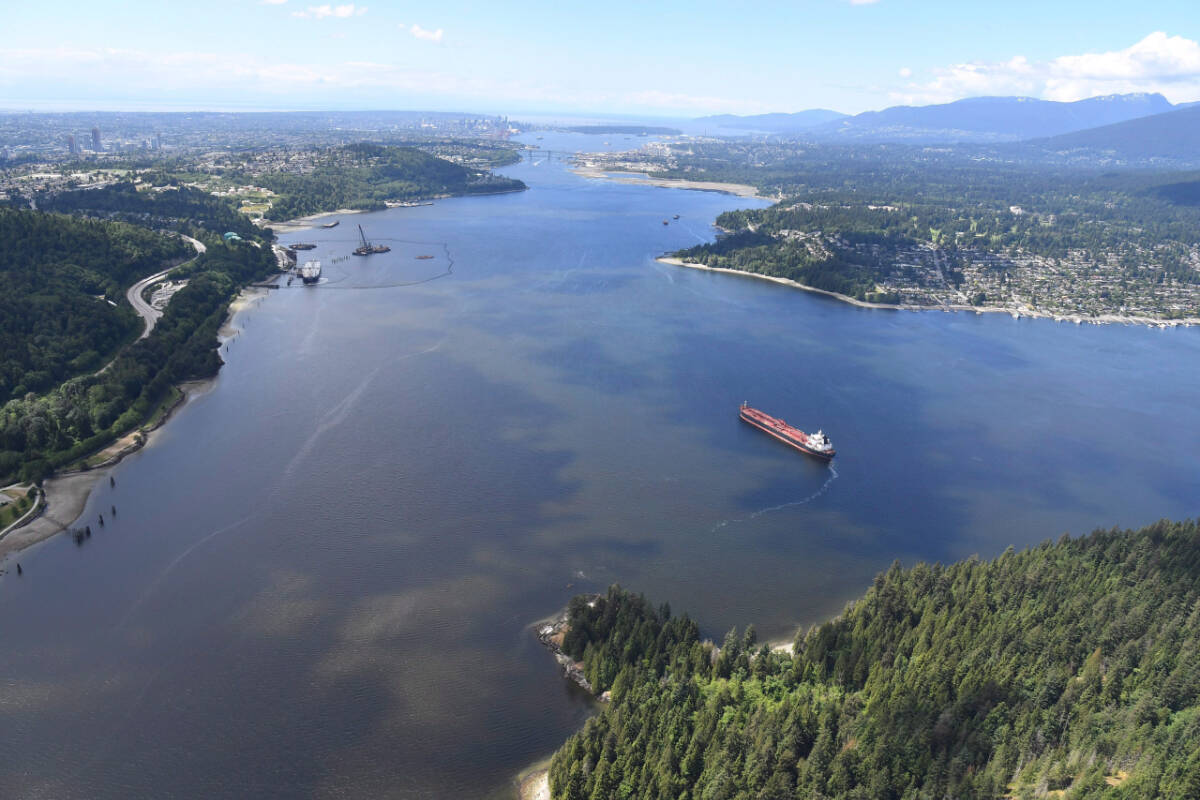A B.C. advocacy group says authorities are not prepared to protect Metro Vancouver residents in the event of an oil tanker spill in the Burrard Inlet.
A long list of municipal leaders, environmental and health organizations, and Indigenous groups voiced concerns about the lack of adequate emergency planning along the Trans Mountain Pipeline’s expanded shipping corridor in a letter to B.C.’s minister of environment on Wednesday (May 8).
With the construction of its pipeline system between Edmonton and B.C.’s coast, Trans Mountain has added three new berths to the Westridge Marine Terminal in Burnaby. The addition is expected to increase the number of Aframax tankers moving through the Burrard Inlet and into the Pacific Ocean from five to up to 34 a month.
That jump in tanker traffic could begin as soon as this month, but the authors of Wednesday’s letter say authorities are ill-prepared for potential accidents.
READ ALSO: Oil begins moving on $34 billion Trans Mountain pipeline expansion
The group says the human health risk assessment, which was commissioned by Trans Mountain and accepted by B.C., contains estimates that don’t follow B.C. Ministry of Health guidance. It is also not clear, according to the group, how local governments and health authorities would coordinate a response in the event of a spill or what resources would be required.
This is seriously concerning, the group says, because while a major spill is rare, the ones that do happen can be extremely dangerous. The advocates point to estimates from Transport Canada’s Emergency Response Guidebook, which finds that 25,000 Metro Vancouver residents would have to be immediately evacuated if an Aframax tanker spilled two-thirds of its 600,000-barrel load and just 0.5 per cent of that reached the shore.
If the dilbit – diluted bitumen oil – ignited, the evacuation number would jump to 105,000 people, the group says.
“Fire- and smoke-related mass casualties would be expected, along with hospitalizations from cardio-respiratory conditions and skin exposures to carcinogens for those who join in clean-up, and contact the spilled diluted bitumen. Damages, including mental health impacts, would be potentially present for years to come,” they say in their letter.
“…I have major concerns about the health and safety risks of a potential tanker spill for patients who live in this region,” Dr. Melissa Lem, a Vancouver family doctor and president of the Canadian Association of Physicians for the Environment added in a statement. “The lack of a workable plan to protect us in the face of a significant increase in tankers carrying highly flammable and explosive cargo right by our neighbourhoods is unconscionable.”
On average over the past two decades, there have been about seven oil spills of seven tonnes or less around the world per year, according to International Tanker Owners Pollution Federation Limited.
“As a city and a region, we have neither the capacity nor a credible plan to evacuate the tens of thousands of people and protect human health in the event of a catastrophic accident and oil spill in the Burrard Inlet – and that is an unacceptable risk,” Vancouver City Councillor Pete Fry said in a statement.
He is joined in the letter by councillors from Burnaby, North Vancouver, New Westminster, Port Moody and Metchosin.
Union of BC Indian Chiefs head, Grand Chief Stewart Phillip, also signed the letter.
“We are gravely concerned with the environmental impacts of the Trans Mountain pipeline expansion – both the incredibly harsh reality of a possible toxic spill as well as the impacts of daily increased tanker traffic on the marine ecosystem, and the increase in greenhouse gas emissions from heavier fossil fuel extraction,” he said.
The group is requesting that B.C.’s minister of environment and climate change, George Heyman, request Trans Mountain and the federal government to halt the movement of any tankers through the Burrard Inlet until a credible oil spill plan is in place.
Speaking with Black Press Media Wednesday afternoon, Heyman said tanker traffic is a federal responsibility.
“We have a very limited scope of regulatory authority.”
He said he has been in touch with his environmental assessment office, however, to make sure the human health risk assessment is in fact robust enough.
In a statement to Black Press Media, Trans Mountain noted that it doesn’t own or operate tankers itself, but that it holds them to Canadian standards. It said response to oil spills is under the jurisdiction of the Canadian Coast Guard and that Trans Mountain has invested $150 million into enhancing the oil spill response regime in southern B.C.
The company said concerns over oil spill response “have been thoroughly canvassed and addressed.”
-With files from Wolf Depner
READ ALSO: Contaminants from oil spills, wildfires ending up inside B.C. whales: study
READ ALSO: Oil spill near Hope ‘a regulatory failure,’ say area First Nations
Breaking NewsEnvironmental assessmentTrans Mountain pipeline


